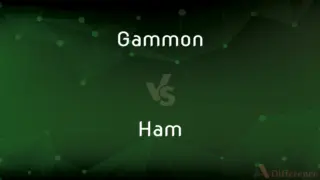Jv vs. Varsity — What's the Difference?
Edited by Tayyaba Rehman — By Fiza Rafique — Updated on May 10, 2024
JV (Junior Varsity) teams prepare less experienced athletes for higher competition levels, whereas Varsity teams showcase a school's top athletes in state or national competitions.

Difference Between Jv and Varsity
Table of Contents
ADVERTISEMENT
Key Differences
JV teams consist of athletes who are typically younger or less experienced, focusing on skill development and preparing players for higher competitive levels. Whereas Varsity teams include the most skilled and experienced athletes, often competing at the highest level available for high school sports.
Athletes on JV teams may not get as much game time in Varsity games, as they are primarily groomed for future competition. On the other hand, Varsity athletes are expected to represent their school in key competitions and have significant play time.
The competition level in JV games is generally less intense than in Varsity matches, which are more competitive and have higher stakes, including regional or national titles.
Coaches may use JV teams to test new strategies or player positions without the same level of risk as Varsity games. Conversely, Varsity games focus on winning and optimizing the team's performance with the best line-up possible.
The selection process for Varsity teams is typically more rigorous, involving tryouts that assess an athlete’s readiness for the highest level of school sports competition. In contrast, JV teams are more accessible to those who are still developing their skills.
ADVERTISEMENT
Comparison Chart
Athlete Experience
Less experienced, younger
Most skilled, experienced
Focus
Development and preparation for higher levels
Competition at the highest school levels
Game Intensity
Lower, developmental
Higher, with more at stake
Role in Competitions
Secondary, developmental role
Primary, competitive role
Selection Rigor
Generally more inclusive
Highly selective, competitive tryouts
Compare with Definitions
Jv
JV competitions are less intense, focusing on learning rather than winning.
The JV soccer match emphasized teamwork and skill development.
Varsity
Selection for Varsity teams is competitive, highlighting top athletic talent.
Varsity tryouts are tough, with many competing for few spots.
Jv
This level is crucial for building confidence and foundational skills in sports.
Playing on the JV team helped him build confidence on the field.
Varsity
Varsity games are highly competitive, often involving regional or national titles.
The Varsity basketball team made it to the state championships.
Jv
They allow athletes to gain experience and training necessary for Varsity.
She used her season on the JV squad to prepare for Varsity trials.
Varsity
Varsity teams represent the pinnacle of high school sports within a school.
She was proud to be selected for the Varsity tennis team.
Jv
JV teams serve as a developmental stage for emerging high school athletes.
He improved his skills playing on the JV basketball team.
Varsity
Varsity athletes are seen as leaders in school sports communities.
He was a captain on the Varsity team and a role model at school.
Jv
Coaches use JV to assess players’ potential and readiness for Varsity.
The coach watched the JV game to scout players for next season’s Varsity team.
Varsity
Athletes on Varsity teams often aspire to collegiate or professional sports careers.
Many players from the Varsity football team received college scholarships.
Jv
A college or university team that competes at a level below the varsity team
Varsity
The principal team representing a university, college, or school in sports, games, or other competitions.
Varsity
Chiefly British A university.
Varsity
University
Varsity
The principal sports team representing an institution (usually a high school, college, or university.)
Varsity
Colloquial contraction of University.
Varsity
The team with the best players of a school or club, being the main representative of the organization in competitive play between schools or organizations. In schools, contrasted with junior varsity. Also used attributively, as, the varsity football team.
Varsity
A British abbreviation of `university'; usually refers to Oxford University or Cambridge University
Varsity
A team representing a college or university
Common Curiosities
What is a JV team?
A JV team is a secondary school sports team designed to develop younger or less experienced athletes.
What are the typical age groups for JV and Varsity teams?
JV teams often consist of freshmen and sophomores, while Varsity teams typically include juniors and seniors, although there are exceptions.
What is a Varsity team?
A Varsity team is the primary sports team of a school, representing the highest level of play in school competitions.
Can JV players be promoted to Varsity?
Yes, JV players often move up to Varsity as they gain skill and experience.
What kind of coaching is expected for JV vs. Varsity teams?
JV teams often receive coaching focused on skills development and team building, whereas Varsity coaching is more strategically focused on winning and performance.
Are tryouts for Varsity more competitive than for JV?
Yes, Varsity tryouts are typically more competitive and rigorous, reflecting the higher level of play.
How is playing time distributed in JV vs. Varsity?
JV athletes may have more balanced playing time for development, whereas Varsity playing time is more performance-based.
Can a freshman make a Varsity team?
Yes, if a freshman demonstrates exceptional skill and maturity, they can be selected for a Varsity team.
How does a JV team differ from a Varsity team in purpose?
JV teams focus on development and preparation for higher levels of competition, while Varsity teams focus on achieving success in competitive events.
How do the stakes of JV and Varsity games compare?
JV games have lower stakes with a focus on development, whereas Varsity games have higher stakes with implications for school prestige and athlete futures.
Do JV teams participate in championships?
JV teams generally do not participate in high-level championships like Varsity teams do, focusing instead on regional or less competitive games.
Why might a school have both JV and Varsity teams?
Having both teams allows schools to cater to different levels of athletic skill and experience, maximizing student participation and development.
How does participation in JV or Varsity sports affect school spirit?
Participation in both levels of sports can boost school spirit by involving more students in athletic endeavors and building school pride.
What are the benefits of starting on a JV team?
Starting on a JV team allows athletes to develop their skills in a less pressured environment, preparing them for higher competition.
What impact does playing on a Varsity team have on an athlete’s future?
Playing on a Varsity team can enhance college scholarship opportunities and increase visibility in competitive sports circles.
Share Your Discovery

Previous Comparison
Gammon vs. Ham
Next Comparison
Counterproposal vs. ProposalAuthor Spotlight
Written by
Fiza RafiqueFiza Rafique is a skilled content writer at AskDifference.com, where she meticulously refines and enhances written pieces. Drawing from her vast editorial expertise, Fiza ensures clarity, accuracy, and precision in every article. Passionate about language, she continually seeks to elevate the quality of content for readers worldwide.
Edited by
Tayyaba RehmanTayyaba Rehman is a distinguished writer, currently serving as a primary contributor to askdifference.com. As a researcher in semantics and etymology, Tayyaba's passion for the complexity of languages and their distinctions has found a perfect home on the platform. Tayyaba delves into the intricacies of language, distinguishing between commonly confused words and phrases, thereby providing clarity for readers worldwide.












































